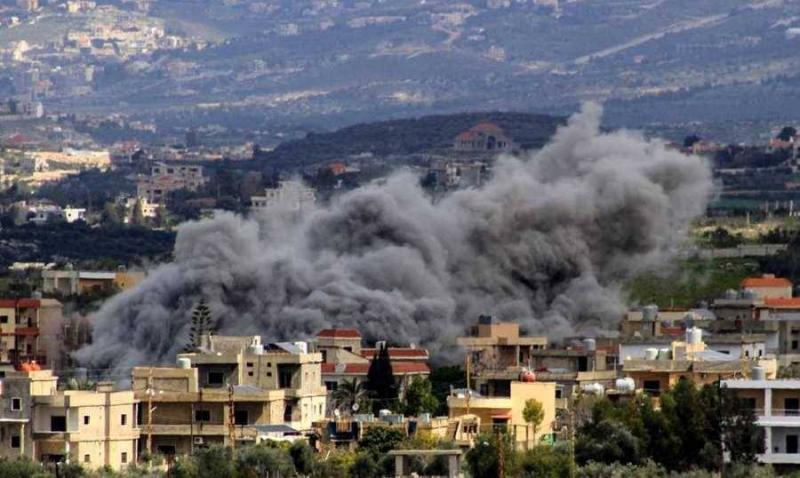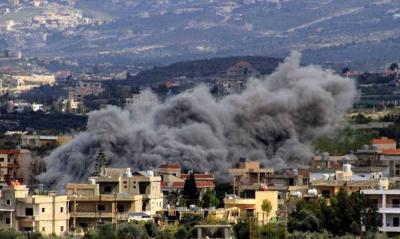The rapidly unfolding events in the region, with Lebanon connected to these hot plates through interconnected channels, leave no room for ambiguity regarding the disintegration and dissolution of institutions amid the glow of political and financial crises of a failed state. This state was already vulnerable before being drawn to the banks of the Gaza war, being swept away by its raging winds, confirming that it is now out of operational service, and perhaps in terms of structure and constitutional framework, according to "Al-Rai" from Kuwait.
The rare intersection of Iran's strategic considerations and Lebanese interests to avoid slipping into a wide war through the open gates of hell in Gaza acts as an uncontrollable factor for the local state. This was evident since Hezbollah opened the engagement front in the south on October 8, allowing it to pursue its internal small wars while remaining passive against the dangers of a major confrontation—which still seems possible either by a significant decision from Israel or a grave miscalculation by the resistance in estimating an action or reaction—which has positioned it in the role of an observer, recording stances that have not hesitated to solidify an unprecedented attachment between the official Lebanon and Hezbollah.
While this attachment has repeatedly been met by opposing Lebanese forces as indicative of the official shortcomings in managing risks in line with the sensitivity of the phase, the more profound dimension of the alignment between Hezbollah and official Lebanon—up to the point where some circles consider the party to be akin to a deep state—finds its best expression in Iran's commitment to the principle of reciprocity with its strong and most complete arm nurtured by the Islamic Revolution. Thus, what applies to it regarding the risk of a major war applies to Hezbollah as well.
Perhaps the latest expression of this was manifested after the attack on the consulate in Damascus and the killing of General Muhammad Reza Zahidi from the Quds Force. There was no doubt that Iran would respond to this strike unlike its actions following the assassination of General Qassem Soleimani in Baghdad or other leaders of the Revolutionary Guard in Syria (after the River of Al-Aqsa), amidst reports from knowledgeable circles indicating that Tehran would not abandon cold logic and flexibility in interpreting and absorbing setbacks. It reaches the point of dealing with Monday's strike as part of an open battle in which Iran participates with every bullet from its arms, and it is expected and natural that Iranians would fall at the hands of Israel, which took its time in responding.
What this means for Lebanon is that in parallel to Iran's elevation of Hezbollah and maintaining it as a strategic reserve for any imposed existential war, Israel—while calculating the probabilities of broad conflict—takes for granted that any comprehensive targeting of the party amounts to a declaration of war on the state of Lebanon, considering that both it and Hezbollah have become one, in light of the completely collapsed state (in the strategic sense) which has been thrust into the mouth of the Gaza volcano without any effective political resistance.
Thus, these circles perceive that the southern Lebanon front will not deviate from Hezbollah’s usual dynamics, except for a carefully calculated expansion to remind Israel of its perpetual readiness for any escalation and preparation to involve more northern areas in the fire zone whenever it crosses the rules of engagement and threatens, as demonstrated by the party's targeting of the Gash Hazerim settlement near Nahariya for the first time with Katyusha rocket launchers.
While anticipation loomed over the speeches delivered at the event organized by the International Committee to commemorate International Quds Day under the title "Al-Quds Platform," which was broadcasted in the Resalat Hall in the Ghobeiry municipality (southern suburb) and to all the countries of the axis, given by Iranian President Ebrahim Raisi, Hezbollah’s Secretary-General Hassan Nasrallah, Ansar Allah Leader Abdul-Malik al-Houthi, Hamas Political Bureau Chief Ismail Haniyeh, and the Secretary-General of the Islamic Jihad Movement in Palestine Ziad al-Nakhala, as well as a speech from Iraqi resistance leader Hadi al-Amiri, it became clear that the injury of three UN peacekeepers monitoring the ceasefire in southern Lebanon on Saturday was due to a landmine, not from a drone strike said to have been Israeli, according to "Al-Rai" from Kuwait.
While the Israeli military accused Hezbollah of being responsible for planting the explosive device in an earlier phase and its explosion while the peacekeepers were on foot patrol along the Blue Line in the Qatmon Valley in the outskirts of Rmeish, Lebanese media close to the party reported that the landmine was a remnants of the Israeli occupation.
Concurrently, the Lebanese file featured in talks held by U.S. Secretary of State Antony Blinken in Paris, where he met with his French counterpart Stefan Sigourne on the need to avoid the expansion of the conflict in Lebanon and to find a diplomatic solution, confirming close coordination with France in this context, hinting at proposals from the two countries, entrusted to the U.S. envoy Amos Hochstein through what is known as the "gradual solution" for implementing Resolution 1701. Sigourne himself had previously submitted a French paper on this matter personally to Beirut.
Against the backdrop of these diplomatic atmospheres, it was notable that the embassy of one of the Eastern European countries distributed messages to all its nationals in Lebanon outlining an action plan for evacuation in the event of any war. The plan includes preparing passports, setting the time to arrive at the airport, and specifying the number of bags to be taken with them.




